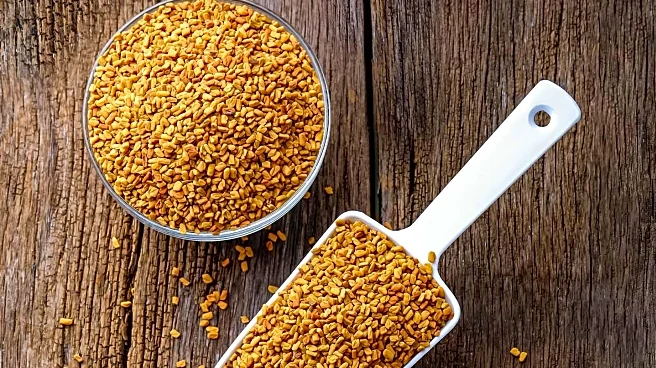What's Happening?
Experts have highlighted the benefits of combining fenugreek seeds with turmeric to help regulate blood sugar levels. Curcumin, the active compound in turmeric, is known for its anti-inflammatory properties
and its ability to improve insulin action. A systematic review titled 'Curcumin and Diabetes' suggests that curcumin positively impacts various aspects of diabetes, including insulin resistance, hyperglycemia, hyperlipidemia, and islet apoptosis and necrosis. The combination of fenugreek seeds and turmeric can be consumed with warm milk or water, or added to curries, to support digestion, reduce inflammation, and enhance overall metabolic health.
Why It's Important?
The combination of fenugreek seeds and turmeric offers a natural approach to managing diabetes, a condition affecting millions of Americans. By improving insulin sensitivity and reducing inflammation, this dietary strategy could help mitigate the complications associated with diabetes, such as cardiovascular disease and neuropathy. This approach aligns with the growing interest in using natural remedies and dietary modifications to manage chronic health conditions, potentially reducing reliance on pharmaceutical interventions and lowering healthcare costs.
What's Next?
As awareness of the benefits of fenugreek seeds and turmeric grows, healthcare providers may increasingly recommend these foods as part of a comprehensive diabetes management plan. Further research could explore the long-term effects of this combination on diabetes control and its potential integration into dietary guidelines. Patients are advised to consult healthcare professionals before making significant changes to their diet, ensuring that these natural remedies complement existing treatment plans.
Beyond the Headlines
The use of natural remedies like fenugreek seeds and turmeric reflects a broader trend towards holistic health practices. This shift may influence food industry trends, with increased demand for products containing these ingredients. Additionally, the cultural significance of turmeric in traditional medicine could foster greater appreciation for diverse dietary practices and their role in health management.









